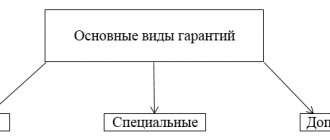Concept and content of a marriage contract
A marriage contract is a document that contains certain clauses regarding the rights and obligations of spouses in relation to common property. Spouses enter into such a contract between themselves, provided that they do not agree that all their property relations should be regulated by the regime of joint ownership.
The content of the marriage contract regulates not only the provisions of the parties’ ownership of property acquired during marriage, but also that which was purchased earlier. The contents of the marriage contract also include certain obligations to pay alimony in the event of a divorce, if the spouses have children or plan to have them. Children also concern property relations between parents, since the content of the marriage contract can indicate what exactly will belong to the child. Spouses prescribe this item at will.
Situations often arise when a husband and wife wish that their property did not belong to them in equal parts. For example, a wife may own an apartment, and a husband may own a country house, etc. The contract also contains clauses on how they will divide all property in the event of a divorce. The legal nature and content of the marriage contract allows for the distribution of all ownership rights to the property that the spouses are just about to acquire.
When and why is a marriage agreement concluded?
Many people groundlessly believe that a prenuptial agreement can only be concluded before marriage. In reality, even spouses who have been in an official union for many years can draw up an agreement at any time when making the appropriate decision. The only difference is the moment of entry into force: when this document is drawn up before marriage, it receives legal force only after registration of the union, and when drawing up an agreement between existing spouses - from the day of registration with a notary.
Before drawing up a marriage contract, you should understand that it regulates purely property issues between spouses. Agreements of this kind are concluded if the method of dividing property established by law (that is, all common property is divided exactly half between spouses) is unacceptable for a particular couple. All newlyweds hope that they will live happily ever after, but the divorce statistics are not encouraging. In the event of a marriage breakdown, a marriage contract will allow you to avoid conflicts and litigation that in most situations arise in the matter of dividing material assets. It is for this purpose that a marriage agreement is concluded. However, this document can also provide for property relations between the wife and husband during the marriage (for example, the amount of support for an incapacitated working spouse).
Legal nature of the marriage contract
The first mention of a marriage contract in the legislation of the Russian Federation appeared in the Civil Code in 1995. Article 256 of this normative document contained the rule that all property acquired by spouses during marriage was common and divided equally, unless otherwise provided for in the marriage contract. Over time, a separate chapter appeared in the Family Code of the Russian Federation, regulating the concept and conditions of a marriage contract.
There is also a certain procedure for concluding a marriage contract. The law establishes that the form of a marriage contract must only be written. A prerequisite is notarized confirmation of the document. Subjects entering into this agreement must not be under 18 years of age.
Concluding an agreement involves paying a state fee of 500 rubles. It is impossible to conclude a marriage contract by proxy, since this requires personal presence. The notary prepares three copies of the document, one of which he keeps for himself and the rest he gives to the spouses.
The conclusion of a marriage contract is possible not only between spouses, but also between those persons who are going to get married. According to this, the moment the document enters into legal force is determined. Until the marriage between them is registered, the marriage contract will not have any legal force. In addition, the law does not provide for the conclusion of an agreement as an obligation of the parties before entering into marriage. If the agreement was drawn up after the marriage, the document comes into force immediately.
In the event that one of the spouses creates conditions under which the second spouse is forced to sign a marriage contract, the document is considered invalid. But for this it is necessary to prove that the marriage contract is an enslaving transaction and was concluded under the influence of various threats, blackmail or violence. In addition, entering into a contract in such circumstances is classified as a criminal offense. Signs of misconduct by one of the parties may result in a real prison sentence.
If any conditions of the marriage contract are not met, it can be terminated at any time. To do this, one of the parties has the right to go to court and request that the document be declared invalid. In addition, spouses can demand termination of the contract if certain circumstances have changed so much that there is no particular need for the marriage contract or other conditions need to be added to it. Other reasons for terminating the marriage contract may be indicated in the document itself. The form of the agreement allows this.
Alimony, common debts and adultery: what to include in a marriage contract – a lawyer answers
A marriage contract as a civilized way to avoid unnecessary conflicts between spouses is very useful from a legal point of view. This is a fairly universal agreement in which many aspects can be spelled out: the procedure for dividing joint property, material obligations towards each other, issues of maintaining and raising children upon divorce. Lawyer, mediator, managing partner of the law firm “Law and Family Mediation” Elena Zhdanovich explained when a prenuptial agreement can be a really good solution.
I heard that in a marriage contract you can specify a clause according to which the spouse, in the event of a divorce, will pay alimony for the child even after his 18th birthday, for example, until he graduates from university. Is it so?
Yes, this is possible. The main thing is that the terms of the marriage contract do not worsen the position of the child, guaranteed by current legislation. For example, it is impossible to establish the payment of alimony for up to 15 years or less. In our practice, there are common cases when a parent assumes obligations to support a child (pay alimony) for a period of up to 21 years.
Is it possible to stipulate in a marriage contract that in the event of adultery, part of the property during a divorce will go to the injured party? Do prenuptial agreements stipulate points regarding the habits, household duties and appearance of the spouses? I heard that it is popular in some countries.
Of course, all this can be specified. The question, as a rule, arises in a different way: how to prove adultery, who can reliably determine this. That is, this provision in practice is not indisputable and often causes many conflicts, calling into question the marriage contract itself and its implementation. Therefore, in my opinion, it is better to determine the procedure for dividing property that is the common joint property of the spouses, without being tied to conditions that have a subjective interpretation.
Can spouses stipulate in a marriage contract the obligation to mutually support each other after a divorce, including in the event of disability or job loss?
Yes they can. These are very important provisions of a prenuptial agreement. It is important to understand that the agreement has the force of an executive document, and in case of its violation, the state will monitor the implementation of its terms. This is an essential guarantee and protection of a spouse who finds himself in a difficult life situation after a divorce.
Does a marriage contract end if one of the spouses dies prematurely? Does this agreement resolve issues regarding acceptance of inheritance? Is it possible, for example, to stipulate that in the event of the death of the wife, the apartment will go to the children?
Inheritance issues are not included in the subject of the marriage contract. The transfer of ownership of property in the event of the death of a spouse can only be permitted within the framework of inheritance legislation, i.e. there will be inheritance by law or by will.
Even if a house or apartment belonged to one of the spouses before marriage, the court may recognize them as joint property. This is possible if, during the marriage, work was carried out here that significantly increased the cost of housing. Can the owner, thanks to a prenuptial agreement, protect himself from possible claims to the house/apartment by his spouse in the event of a divorce?
A prenuptial agreement can protect the spouse in such a situation. It can contain the following condition: the property that belonged to each of us before marriage, as well as any other property received by each of us after marriage as a gift or by inheritance, remains the property of the person to whom it belonged, was gifted or to whom passed by inheritance, even if investments made in this property during the marriage significantly increase its value (major repairs, reconstruction, etc.), regardless of what sources the investments were made and their amounts.
Let’s say that according to a marriage contract, one of the spouses should receive property (for example, an apartment) during a divorce, which significantly exceeds his/her allotted share. In order to somehow equalize the rights of the ex-husband and wife, a condition regarding monetary compensation is prescribed in the contract. Is it possible to transfer a material object in exchange for such compensation if there is not a sufficient amount of money?
In this case, we are talking about the procedure for transferring property to each of the spouses after the divorce, which can actually be determined in the marriage contract in accordance with Article 13 of the Code on Marriage and Family.
It is important to understand that the marriage contract determines the legal regime of the common joint property of the spouses, i.e. it can only indicate property that was acquired during marriage. If the material object belongs to the spouse as personal property, a transaction of a different kind must be drawn up. All options for compensation and their execution must be discussed with a lawyer, since in such a situation many legal nuances arise.
The parents plan to give the newlyweds part of the money to buy an apartment. How to formalize this assistance so that in the event of a divorce, when dividing property, this share is not considered jointly acquired, but is taken into account precisely as the daughter’s share?
In this situation, you can conclude a gift agreement or specify in the marriage contract that a large share in the apartment purchased by the newlyweds during the marriage will belong to the spouse, since it was her parents who provided great financial assistance in the purchase of housing.
Is it possible to stipulate in a marriage contract that in the event of a divorce, the property of one of the spouses will pass to the other? For example, will a car bought by a spouse before marriage go to his ex-wife?
No, the marriage contract only defines the regime of joint ownership of the spouses. A car purchased before marriage can be gifted to your spouse.
Should the conditions and procedure for the return of common debts and other joint obligations of the spouses be defined in the marriage contract?
Such conditions can be set out in a marriage contract. For example, you can indicate that each spouse is responsible independently for loans, credits and other debt obligations received in his name during the marriage, with his income and property.
Can ex-husband and wife who are planning to remarry enter into a prenuptial agreement?
According to Art. 13 of the Code on Marriage and Family, Persons entering into marriage and spouses have the right to conclude a marriage contract at any time and to the extent of rights and obligations determined by them. Therefore, in this case, they will enter into a marriage contract not as former spouses, but as persons entering into marriage.
Is it possible to conclude a marriage contract while living in a so-called civil marriage? If not, then how to officially regulate property relations, including those regarding things acquired jointly and housing under construction?
The basis for a marriage contract is a marriage concluded under the conditions provided for by current legislation.
To settle property relations of this kind (without registering a marriage relationship), it is necessary to conclude civil transactions that will give rise to legal consequences.
Does a marriage contract regarding real estate outside Belarus have legal force?
A marriage contract executed in Belarus will apply to real estate located only on the territory of our country. For example, an Italian citizen and a Belarusian citizen, married, decided to enter into a marriage contract. In such a situation, the notary must explain to them that, in accordance with the legislation of our country, the agreement will be valid in relation to property located on the territory of Belarus. If they want to draw up a marriage contract that would be valid in two countries, it should reflect that the law of Belarus will apply to property located on the territory of our republic, and the law of this country will apply to property located on the territory of Italy.
According to the marriage contract, the apartment should have become the property of the wife after the divorce. However, for some reason, the agreement was not registered with the organization for state registration of real estate, rights to it and transactions with it, accordingly, it is considered invalid. Is it possible to somehow improve the situation?
The Code on Marriage and Family establishes a requirement for mandatory registration of a marriage contract with the state registration authorities of real estate, rights to it and transactions with it, if it contains conditions that are or may become the basis for the emergence, transfer, termination of rights, restrictions (encumbrances) ) rights to real estate.
In accordance with the provisions of the Civil Code (Civil Code), if a transaction requiring state registration is completed in the proper form, but one of the parties avoids registering it, the court has the right, at the request of the other party, to make a decision to register the transaction. In this case, it is registered in accordance with the court decision. The rights and obligations of the parties to a transaction arise from the moment of its registration.
In what cases can a marriage contract be declared invalid in whole or in part by the court?
A marriage contract may be declared invalid in whole or in part by a court on the general grounds for recognizing transactions as invalid, provided for by the Civil Code. For example, such a reason may be the non-compliance of the marriage contract with current legislation. Or his conclusion with a citizen who was recognized by the court as incompetent, or with a citizen, although legally competent, but at the time of his imprisonment in such a state where he was not able to understand the meaning of his actions or manage them, or with a citizen whose legal capacity was limited by the court due to the abuse of alcoholic beverages, narcotic drugs, psychotropic substances, their analogues, without the consent of the guardian, etc. This list is, of course, not exhaustive - the Civil Code also provides for numerous other grounds for recognizing a transaction as invalid, and, therefore, for recognizing a marriage contract as such.
In addition, the basis for declaring a marriage contract invalid is failure to comply with clause 11 of the resolution of the Plenum of the Supreme Court “On the practice of application of legislation by courts when considering cases of divorce.” Based on its meaning, a marriage contract should not contain conditions that place one of the spouses in an extremely unfavorable position. According to established judicial practice, it is this basis that is most often used to invalidate a marriage contract.
According to BELTA
Rights and obligations of the parties
First of all, the conclusion of a marriage contract implies the property rights and obligations of the spouses. In addition, the document may contain conditions regarding the maintenance of one spouse by the other and various family expenses. The legal nature of the marriage contract allows the inclusion of any clauses relating only to property relations in marriage.
It is important to know that the legal nature of the marriage contract does not allow the regulation of the rights of parents in relation to children. The law prohibits establishing with whom exactly and which of the children will remain with their parents after a divorce. It also does not indicate the form of communication between the spouses after the divorce. These issues are resolved by the parties in a general manner, that is, by mutual agreement or through court.
Family income and expenses
The marriage contract stipulates all the nuances relating to property, as well as the income and expenses of the spouses. For example, the parties can establish a procedure for sharing in each other’s income. By income we mean receiving profit from rent, bank deposits, securities, etc. Often the concept of “income” in a marriage contract implies such in-kind income as crops or the offspring of livestock.
And if, by law, all income belongs to the owner of the object who brings it, then the terms of the marriage contract can change this order. For example, a percentage of one of the husband's bank deposits may belong to the wife, and vice versa. This clause is not mandatory, but it is often indicated in marriage contracts.
In addition to income, a marriage contract can also control all family expenses. Usually the parties describe this clause of the contract in great detail. Firstly, all family expenses are divided into groups for convenience. These could be current expenses, payment for various utilities, insurance premiums, payment for education, treatment, travel, etc. Secondly, the document must indicate which of the spouses undertakes to bear certain expenses. It also clarifies to what extent and for what amount one of the parties will be responsible for these expenses.
Alimony payments
This clause is often included in a marriage contract. According to the document, one of the spouses has the right to alimony after divorce. However, he cannot demand an increase in this amount in court. If the couple does not have children, then the disabled spouse may receive alimony.
In addition, monthly maintenance can be paid even if the spouses are married. As a matter of law, the parties do not have the actual right to enter into an alimony agreement to pay funds to one of the spouses in a marriage. But on the other hand, the Family Code requires that such an agreement be recognized as valid.
Certain non-property conditions
The legal nature of a marriage contract in Russia implies the absence of any clauses on non-property relations. Spouses cannot set such conditions not only regarding each other, but also their children. However, there is the concept of non-proprietary conditions in a marriage contract.
That is, certain property relations may directly depend on non-property conditions. These are:
- time frame;
- the occurrence of special circumstances.
Such conditions may limit or change the rights and obligations of spouses with respect to property. This may be the birth of children, which changes the parents' rights to property. Or compensation for moral damage if one of the spouses behaves unworthily towards the other. Property relations can change not only with the onset of a specific event, but also after a specified time.
Features of marriage agreements
When drawing up this legal document, you should remember the features inherent in it:
- A marriage contract must be notarized.
- The document cannot contain provisions that will limit the personal rights, freedoms and legal capacity of the spouses.
- The agreement can be changed or terminated if one of the parties violates the terms of the agreement or if mutual agreement is reached.
- The contract should not indicate specific numbers, but it is best to use shares and percentages.
- Most often, the document stipulates the principles of division relating to joint and separate property.
- If one of the spouses is a foreigner, then the content of the marriage contract should not contradict the legislation of his country.
- The duration of the document is chosen by the parties independently: the contract can be indefinite, until a certain time or the occurrence of a specific event.
- Only persons who have reached the age of majority can enter into an agreement.
Conditions that cannot be included in a prenuptial agreement
The conclusion of a marriage contract implies that there are conditions that are prohibited from being included in this document. Otherwise, it will be declared invalid and lose its force. Spouses cannot indicate in the marriage contract:
- non-property relations (the right to children and communication with them, as well as sanctions in case of betrayal of a spouse);
- any conditions implying limitation of the spouse’s legal capacity;
- prohibition on a spouse going to court to protect their own rights and interests;
- deprivation of a spouse of material support who needs it, if the second spouse has the opportunity to provide it.
The concept of non-property relations also includes the mutual love of spouses for each other (you cannot oblige another person to love), fidelity, absence of bad habits, etc. All these points should not be in the marriage contract. As for limiting legal capacity, the conclusion of an agreement should not be aimed at prohibiting the choice of profession, freedom of movement, choice of place of work, etc. Spouses do not have the right to impose such conditions on each other, nor to force their children to do so.
Does a marriage contract work in Russia?
When understanding why a marriage contract is needed, you should understand its pros and cons. They follow from the legislation. So, the advantages of a marriage contract are seen as follows:
- clarity and intelligibility: the property rights of the parties;
- their mutual obligations;
In addition, if the agreement is concluded correctly, then the parties have no doubts about such a sensitive aspect as the division of property after breaking ties. Everyone understands what they will get under the terms of the contract.
The next positive side is that the text can be changed after the marriage contract comes into force. This situation also exists in the UK. By the way, the condition for the document not to raise doubts among the notary is the presence of a clause on the possibility of drawing up additions or changes to the marriage contract.
The treaty seems to have no downsides, but critics have discovered them. Citizens are dissatisfied with the following:
- Some people think that entering into a contract is too expensive.
- Others see the moral side of the issue as a problem. They say that the legislative conditions that must be met to conclude a marriage contract undermine the trust of partners in each other.
Critics should think about the fact that they have to tell the lawyer all the ins and outs when the marriage paradise comes to an end, and there are no agreements a priori. A prenuptial agreement has certain pros and cons. Only spouses can decide whether they should be used to create a strong family.
Advantages
- This agreement can be registered before marriage and at any time after it (before divorce).
- It will allow you to differentiate who owns what property before marriage, during common life and after divorce.
- This agreement allows you to clarify who will become the owner of the donated property.
- During a divorce, spouses can exclude disputes regarding the division of property.
- This document allows you to organize family affairs regarding property. In particular, this includes assessing income, dividing responsibilities regarding spending, planning expensive purchases, and dividing purchased property.
- It will allow you to resolve disputes between spouses regarding debts and loans.
- Allows you to distribute their income and expenses between spouses.
- Determines the nuances of maintaining a member of a married couple who has lost the ability to work.
- Correct drafting of the contract, verification by a notary of the legal capacity of both spouses, and notarization of the contract itself ensure a transparent registration process and reliable regulation of marital relations.
Flaws
- Most Russians still consider a marriage contract to be a negative phenomenon. The initiator of this contract may be accused of commercialism, self-interest, greed, and malicious intent. Many people consider discussing the material relations of spouses to be bad manners. Although a marriage contract proves honesty in the relationship between spouses, false “decency” is inappropriate here.
- Such an agreement can only be concluded with the participation of a notary. It is also impossible to make changes to this contract or cancel it without a notary. Notary services require payment.
- If changes are made to the Insurance Code or Civil Code, this agreement will also need to be amended in accordance with the new laws. Otherwise, it will lose force (such precedents have happened; spouses were forced to divide property in accordance with new legal norms).
- Even if you take the most careful approach and seek help from the best lawyers, you cannot foresee everything in a contract. It often needs to be supplemented and changed. This means new costs for the services of lawyers and notaries.
- If the contract contains unclear wording and unclear clauses that can be interpreted in two ways, it will be impossible to avoid conflicts, disputes, and lawsuits. The contract may also be declared invalid in court.
In the Russian Federation, the execution of such an agreement is not yet widely popular. No more than 7% of couples enter into it. However, this document has legal force, except in cases provided for by the IC and the Civil Code of the Russian Federation, and in a number of situations helps to protect one’s property rights.
To change the text or terminate the contract, it is required that the spouses reach an agreement on this issue. Such an agreement must have the same form in which the contract itself is drawn up.
If legally unacceptable conditions are included in the text, these particular conditions are considered invalid - but only they, and not the entire agreement. However, the entire document is considered invalid if (according to the court verdict) one of the spouses finds himself in a completely disadvantageous position under the contract. Therefore, it cannot be stated that one party gets everything and the other gets nothing (in a divorce).
In Russian family practice, the prenuptial agreement appeared relatively recently. The Family Code, adopted in 1994, introduced the concept of a marriage contract into legal circulation, allowing spouses to negotiate issues relating to their personal and common property individually.
Duration of the marriage contract
The legislation does not establish specific validity periods for the document. This is decided only by the parties who enter into this agreement. A marriage contract can be concluded for a specific period, or it can remain valid indefinitely. In any case, its validity (apart from certain obligations) terminates upon divorce.
Despite all the advantages of a prenuptial agreement, it is not yet as popular in Russia as it is abroad. Most often, it is necessary for citizens who are owners of valuable property and are trying to maintain their rights to it. In addition, notarial support of such an agreement is very expensive. However, a prenuptial agreement allows many couples to avoid litigation involving the division of property and joint children during a divorce.










